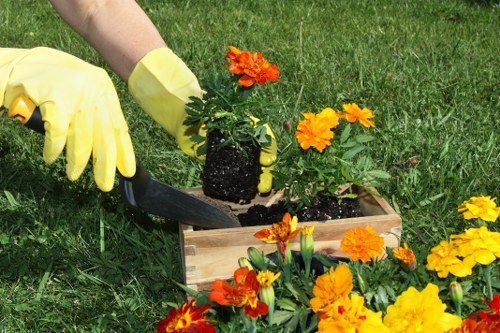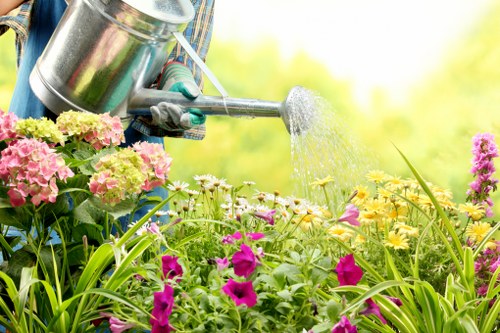Lawn Mowing Queens Park: Your Ultimate Guide to a Beautiful Lawn

Maintaining a lush, green lawn in Queens Park can be a rewarding yet challenging task. Whether you are a homeowner looking to enhance your property's curb appeal or a renter aiming to keep your outdoor space tidy, understanding the nuances of lawn mowing in Queens Park is essential. This guide provides comprehensive insights into the best practices, tools, and local considerations to ensure your lawn remains healthy and vibrant throughout the year.
Queens Park enjoys a temperate climate, which is ideal for various grass types. However, the unique weather patterns and soil conditions in the area require specific lawn care strategies. From selecting the right mowing schedule to choosing the appropriate equipment, every aspect plays a crucial role in maintaining your lawn's health and appearance.
In this article, we will explore the essential tips and techniques for effective lawn mowing in Queens Park. We will also discuss the benefits of professional lawn mowing services and highlight the top areas surrounding Queens Park that can benefit from expert lawn care.
Why Lawn Mowing is Important for Your Queens Park Property

Lawn mowing is more than just a routine chore; it is a vital component of lawn maintenance that contributes to the overall health and aesthetics of your outdoor space. Regular mowing helps in:
- Promoting Healthy Growth: Cutting the grass stimulates new growth, ensuring a thick and resilient lawn.
- Preventing Weeds: Regular mowing keeps weeds at bay by removing their ability to flower and spread.
- Enhancing Curb Appeal: A well-mowed lawn significantly boosts the visual appeal of your property.
- Reducing Pest Infestation: Shorter grass can deter pests that thrive in tall, unkempt lawns.
In Queens Park, where outdoor spaces are highly valued, maintaining a pristine lawn can also increase your property's market value. Homebuyers often look for properties with well-maintained lawns, making regular mowing an investment in your home's future.
Moreover, lawn mowing contributes to environmental sustainability. A healthy lawn absorbs carbon dioxide, cools the surrounding air, and provides a habitat for beneficial insects and wildlife. By maintaining your lawn, you are also contributing to the local ecosystem and promoting a greener Queens Park.
Choosing the Right Grass for Queens Park

Selecting the appropriate grass type is crucial for the success of your lawn in Queens Park. The climate and soil conditions in the area influence the best grass varieties to use. Here are some popular options:
- Fescue: Fescue grass is known for its versatility and resilience. It thrives in both sun and shade, making it suitable for various areas in Queens Park.
- Bentgrass: Ideal for cooler climates, bentgrass offers a fine texture and rich green color. It requires regular maintenance but provides a pristine appearance.
- Ryegrass: Ryegrass germinates quickly, providing fast coverage. It is resistant to wear and tear, making it suitable for high-traffic areas.
Soil Preparation and Maintenance
Healthy soil is the foundation of a thriving lawn. Conduct a soil test to determine its pH level and nutrient content. Based on the results, you may need to adjust the soil by adding lime to raise pH or sulfur to lower it. Incorporating organic matter like compost can also improve soil structure and fertility.
Regular aeration is essential to prevent soil compaction, allowing air, water, and nutrients to reach the grass roots effectively. Aerate your lawn at least once a year, preferably in the spring or fall, to maintain optimal soil conditions.
Best Practices for Lawn Mowing in Queens Park

Adhering to best mowing practices ensures that your lawn remains healthy and visually appealing. Here are some key guidelines to follow:
- Maintain the Right Height: Adjust your mower to cut the grass to the recommended height for your specific grass type. Generally, keeping the grass around 2.5 to 3.5 inches promotes strong root growth.
- Don't Cut Too Short: Cutting grass too short, known as scalping, can stress the plants and make them more susceptible to weeds and pests.
- Mow When the Grass is Dry: Wet grass can clump and clog your mower, leading to uneven cuts. Wait until the grass dries for a cleaner mow.
- Change Mowing Patterns: Varying your mowing direction each time prevents soil compaction and encourages upright grass growth.
- Sharpen Mower Blades: Sharp blades make clean cuts, reducing damage to the grass and promoting faster healing.
Implementing these practices can significantly enhance the health and appearance of your lawn, ensuring it remains a beautiful asset to your Queens Park property.
Seasonal Mowing Tips
Lawn care needs vary with the seasons. Understanding these variations is crucial for year-round lawn health:
- Spring: Focus on removing winter debris, aerating the soil, and applying fertilizers to promote new growth.
- Summer: Ensure adequate watering and mow regularly to manage heat stress on the grass.
- Fall: Reduce mowing frequency as growth slows and prepare the lawn for winter by overseeding and applying necessary nutrients.
- Winter: Minimal mowing is required. Keep the grass slightly longer to protect it from harsh weather conditions.
Essential Lawn Mowing Tools and Equipment

Having the right tools is fundamental to effective lawn mowing. Here are the essential equipment pieces you need:
- Quality Lawn Mower: Choose between gas-powered, electric, or battery-operated mowers based on your lawn size and personal preference.
- Edging Tool: For crisp edges along walkways, driveways, and flower beds.
- Trimmer or String Cutter: Ideal for reaching areas that the mower cannot, ensuring a uniformly trimmed lawn.
- Rake: Use it to gather clippings and remove debris, promoting a healthier lawn.
- Leaf Blower: Efficiently clear leaves and other lightweight debris from your lawn.
Investing in high-quality tools not only makes the mowing process easier but also contributes to the overall health of your lawn by ensuring clean and precise cuts.
Maintenance of Lawn Mowing Equipment
Proper maintenance of your lawn mowing tools extends their lifespan and ensures they operate efficiently. Regularly clean your mower to remove grass clippings and prevent buildup. Sharpen blades at least once a season to maintain optimal cutting performance. For gas-powered mowers, change the oil and replace air filters as recommended by the manufacturer. Electrical components should be checked periodically for wear and tear, ensuring safety and reliability during use.
Professional Lawn Mowing Services in Queens Park

While DIY lawn mowing can be fulfilling, professional lawn mowing services offer numerous benefits, especially for those with large or complex lawns. Professional services provide:
- Expertise: Trained professionals understand the specific needs of your lawn, ensuring it receives the best care possible.
- Time-Saving: Outsourcing mowing tasks frees up your time for other important activities.
- Consistent Results: Regular professional maintenance guarantees a consistently well-manicured lawn.
- Access to Advanced Equipment: Professionals use high-quality tools that may be more efficient and effective than standard household equipment.
Hiring a reputable lawn mowing service in Queens Park can significantly enhance the health and appearance of your lawn, providing peace of mind and exceptional outdoor aesthetics.
Choosing the Right Lawn Mowing Service
When selecting a lawn mowing service, consider the following factors:
- Reputation: Look for services with positive reviews and testimonials from satisfied customers.
- Experience: An experienced provider is more likely to deliver high-quality results and handle various lawn challenges.
- Services Offered: Ensure the service includes all the tasks you require, such as mowing, edging, trimming, and debris removal.
- Pricing: Compare quotes from different providers to find a service that fits your budget without compromising quality.
- Insurance: Verify that the service is insured to protect against any potential damage or accidents.
Local Considerations for Lawn Mowing in Queens Park

Queens Park's unique local environment influences lawn care practices. Here are some local considerations to keep in mind:
- Climate: Queens Park experiences a temperate climate with distinct seasons, affecting mowing schedules and lawn care routines.
- Soil Type: The region's soil composition may require specific fertilizers or soil amendments to support healthy grass growth.
- Local Flora: Be mindful of native plants and wildlife, ensuring that lawn care practices do not disrupt the local ecosystem.
- Regulations: Check for any local ordinances or HOA guidelines related to lawn maintenance to ensure compliance.
Watering Practices
Efficient watering is crucial for maintaining a healthy lawn, especially during the hot summer months. It's recommended to water your lawn early in the morning to reduce evaporation and minimize disease risk. Deep, infrequent watering encourages deep root growth, making your grass more resilient to drought and heat stress. Consider using a rain gauge or moisture sensors to optimize your watering schedule based on actual needs.
Top Nearby Areas to Queens Park for Lawn Mowing Services
Queens Park is surrounded by several neighborhoods that also benefit from professional lawn mowing services. Here are the top nearby areas:
- Kensington: Known for its elegant homes and well-maintained gardens, Kensington residents often seek expert lawn care to preserve their property's beauty.
- Paddington: With a mix of residential and commercial properties, Paddington requires versatile lawn services to cater to diverse landscaping needs.
- Hammersmith: The bustling area of Hammersmith benefits from regular lawn maintenance to keep public and private green spaces inviting.
- Ealing: Ealing's expansive parks and gardens make it a prime location for comprehensive lawn mowing and landscaping services.
- Chiswick: Chiswick's vibrant community values well-kept lawns, making professional mowing services highly sought after.
- Notting Hill: The picturesque streets of Notting Hill require meticulous lawn care to maintain their charming appearance.
- Shepherd’s Bush: Shepherd’s Bush combines residential areas with commercial zones, necessitating flexible and reliable lawn mowing solutions.
- Westbourne Grove: Known for its boutique shops and lovely residences, Westbourne Grove residents prioritize high-quality lawn maintenance.
- South Kilburn: South Kilburn's diverse housing styles require tailored lawn care services to meet varied landscaping needs.
- North Kensington: With its vibrant community, North Kensington enjoys regular lawn mowing to enhance its green spaces.
Eco-Friendly Lawn Mowing Practices
Adopting eco-friendly practices in lawn mowing not only benefits your garden but also the environment. Here are some sustainable approaches:
- Mulching: Use a mulching mower to recycle grass clippings, which decompose and nourish the soil.
- Electric Mowers: Opt for electric or battery-powered mowers to reduce carbon emissions and noise pollution.
- Organic Fertilizers: Choose organic fertilizers to enhance soil health without harmful chemicals.
- Water Conservation: Implement rainwater harvesting systems or use drought-resistant grass varieties to minimize water usage.
- Reduce Chemical Use: Limit the use of pesticides and herbicides, opting for natural alternatives to manage pests and weeds.
By integrating these practices, you contribute to a healthier ecosystem while maintaining a beautiful lawn in Queens Park.
Composting Grass Clippings
Composting grass clippings is an excellent way to recycle nutrients back into your lawn. Instead of disposing of the clippings, allow them to decompose naturally in a compost pile. This process produces rich organic matter that can be used to improve soil structure and fertility, promoting a healthier and more resilient lawn.
Common Lawn Mowing Mistakes to Avoid
Avoiding common lawn mowing mistakes can significantly enhance your lawn's health and appearance. Here are some pitfalls to watch out for:
- Cutting Too Frequently: Mowing your lawn too often can stress the grass, preventing it from developing strong roots.
- Ignoring Lawn Health: Failing to address underlying lawn issues, such as pests or diseases, can lead to long-term damage.
- Using Dull Blades: Dull mower blades tear the grass instead of cutting it cleanly, making the lawn more susceptible to diseases.
- Over-Fertilizing: Excessive fertilizer application can burn the grass and pollute local waterways.
- Improper Mowing Height: Setting the mower too high or too low can adversely affect grass health and aesthetics.
By being mindful of these common mistakes, you can maintain a healthy and attractive lawn in Queens Park with minimal effort.
Dealing with Lawn Pests
Pests can wreak havoc on your lawn, leading to thinning grass and unsightly patches. Common lawn pests in Queens Park include:
- Grubs: These larvae feed on grass roots, weakening the lawn and making it more susceptible to drought and disease.
- Chinch Bugs: Known for causing brown patches, chinch bugs damage grass by sucking out the plant juices.
- Armyworms: These pests can quickly consume large areas of grass, leading to significant damage if not controlled.
Implement integrated pest management (IPM) strategies to control pests effectively. This approach includes monitoring pest populations, encouraging natural predators, and using targeted treatments when necessary.
Enhancing Your Lawn with Additional Landscaping
Beyond mowing, enhancing your lawn with additional landscaping elements can create a more inviting and functional outdoor space. Consider the following ideas:
- Flower Beds: Incorporate colorful flowers around your lawn edges to add beauty and attract pollinators.
- Pathways: Create pathways using stone, gravel, or pavers to improve accessibility and aesthetics.
- Seating Areas: Add benches or outdoor furniture to create relaxing spots within your lawn.
- Water Features: Install fountains or ponds to introduce the soothing sound of water and enhance visual appeal.
- Lighting: Use outdoor lighting to highlight lawn features and improve safety for evening use.
These landscaping enhancements not only beautify your lawn but also increase its functionality, making your outdoor space more enjoyable for family and guests.
Choosing Native Plants
Incorporating native plants into your landscaping supports local biodiversity and requires less maintenance. Native plants are adapted to the local climate and soil conditions, making them more resilient and easier to care for. They also provide essential habitats for local wildlife, contributing to a balanced ecosystem in Queens Park.
Creating a Lawn Care Schedule
Establishing a consistent lawn care schedule ensures that your lawn receives the necessary attention throughout the year. Here's a general timeline to follow:
- Spring: Rake to remove debris, aerate the soil, fertilize, and begin regular mowing as growth resumes.
- Summer: Maintain mowing frequency, ensure adequate watering, and control weeds and pests as needed.
- Fall: Continue mowing until growth slows, overseed if necessary, and apply a fall fertilizer to prepare for winter.
- Winter: Minimize mowing, protect the lawn from excessive snow or ice, and plan for spring care.
Tracking Lawn Health
Regularly monitor your lawn for signs of stress, disease, or pest infestation. Early detection allows for prompt intervention, preventing minor issues from escalating into major problems. Keep a lawn care journal to track maintenance activities, weather conditions, and any observed issues, helping you make informed decisions for future care.
Conclusion
Maintaining a beautiful lawn in Queens Park requires a combination of proper mowing techniques, the right tools, and an understanding of the local environment. Whether you choose to handle lawn care yourself or enlist the help of professional services, following these guidelines will ensure that your lawn remains healthy, vibrant, and a source of pride for your property.
By investing time and effort into your lawn mowing routine, you contribute to a greener, more enjoyable Queens Park community. Embrace the process, stay informed about best practices, and enjoy the benefits of a well-maintained lawn all year round.
Frequently Asked Questions
1. How often should I mow my lawn in Queens Park?
Generally, mowing your lawn once a week during the growing season (spring and summer) is recommended. However, the frequency may vary based on grass growth rates and weather conditions.
2. What is the best time of day to mow the lawn?
The best time to mow your lawn is in the late morning or early afternoon when the grass is dry. Avoid mowing early in the morning or late in the evening to reduce stress on the grass.
3. Should I bag my grass clippings or leave them on the lawn?
Leaving grass clippings on the lawn as mulch can provide nutrients and retain moisture, promoting healthy growth. However, if the clippings are too long or thick, it might be better to bag them to prevent smothering the grass.
4. How can I prevent weeds from taking over my lawn?
Regular mowing, proper watering, and fertilization can help prevent weeds. Additionally, applying pre-emergent herbicides and maintaining a healthy, dense lawn can reduce weed growth.
5. When is the best time to fertilize my lawn?
The best times to fertilize your lawn are in the spring and fall. Spring fertilization supports new growth, while fall fertilization strengthens roots and prepares the lawn for winter.